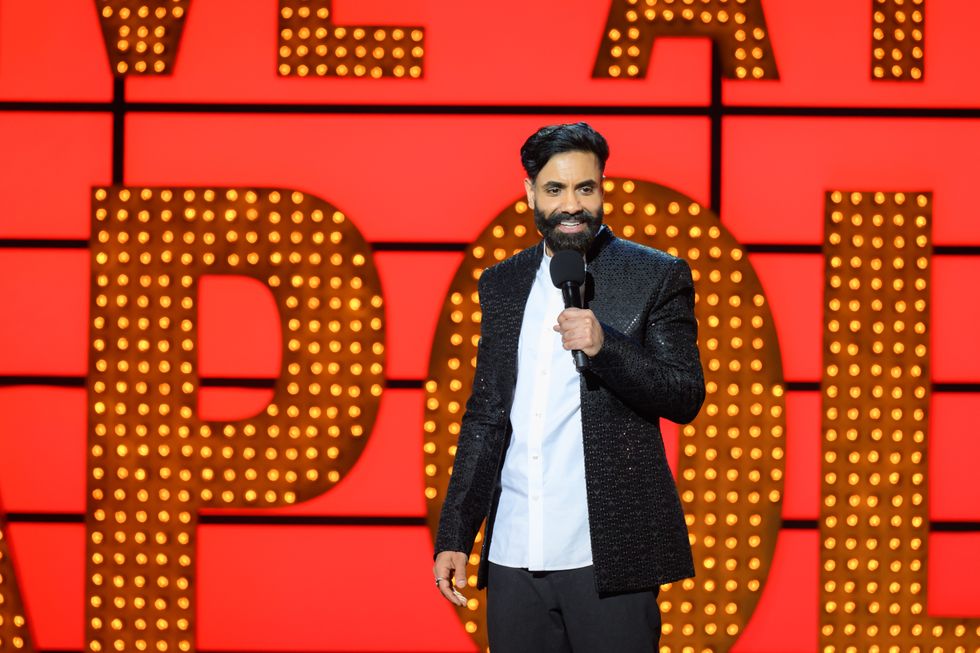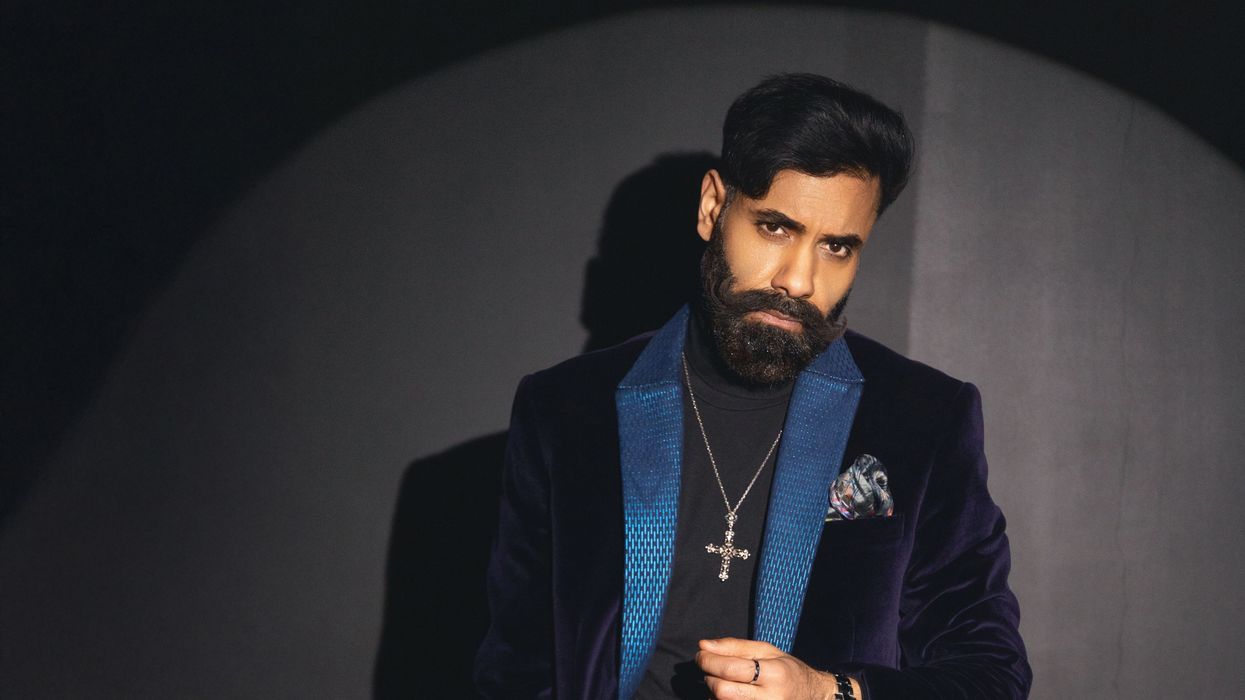THERE are more stand-up comedians than ever now, but few connect with a cross-cultural audience of all ages quite like Paul Chowdhry.
The pioneer, who smashed open doors for British Asian stand-up stars, is embarking on his biggest UK tour in March, which includes major arena shows.
His continued dominance is evident in his new show Englandia selling out venues well in advance, leading to addition - al dates being added. Following hugely successful previous tours, Chowdhry’s latest show tackles relatable themes, including identity.
When Eastern Eye caught up with the fabulously talented comedian, he was finalising his new show and spoke about his craft, inspirations, key advice for new talent, fearlessness on stage, and his gym-honed physique.
How do you feel ahead of a major tour?
Before the tour, I’m just writing and getting it all together. It’s like training in the gym – for a comedian, the equiva-lent is performing in small clubs daily, testing material, and refining the show. By the time the tour starts and fin-ishes, it will have gone through about 15 different versions.
You’ve sold around 100,000 tickets on a previous tour, yet this is your biggest one yet. What can audiences expect from Englandia?
The last show (Family Friendly Comedian) aired on Sky TV in December. Before that, I did PC’s World and What’s Happening White People. This time, I put ‘England’ and ‘India’ together for Englandia. It’s a show about identity and where we all belong. We’ll explore that theme and what Englandia means throughout the show.
Do you know if material will be funny while writing it?
You think it’s funny, but you only realise when you get on stage. That’s why, for a 75-to-90-minute show, you need to write about four hours of material. It’s like writing a book – it goes through editors – or how filmmakers do test screen-ings. Comedians test material live. I don’t do many pre - views, but I perform in small venues to gauge what works. Comedy is linguistics, isn’t it? A scientific study of language, where changing a phrase can alter everything.
How much of your comedy is driven by fearlessness?
You say ‘fearless,’ but I just say what I feel. My comedy over the last 25 years has been based on my life. We had to be fearless if we grew up in the 1970s and 80s from backgrounds like ours. Otherwise, we wouldn’t have reached this point – there were no opportunities for people like us back then.
What does comedy mean to you today?
Comedy is just my life. It’s my identity, my pronoun. It’s who I am. My whole existence is comedy.
You have a rare ability to connect with cross-cultural audiences. How does that feel?
Everyone comes into my room – people of all ages and backgrounds. I’m honoured to have such big, diverse, and dedicated audiences. This tour is selling so well, and I’m humbled that it’s still happening after all these years. When people leave their homes, I want to give them a great show. If I go out to see someone, I expect brilliance. The fact that audiences keep returning is a real honour.
How does it feel to have so many sold-out shows?
I still can’t believe people keep coming. Shows are selling out, and we’re adding more dates due to demand. It means a lot, but I don’t overthink it. When I’m on stage, I focus on the show. With the stage lights on, you can only see the front row – you don’t realise thousands are watching. You just have to be in the zone.
What’s the secret to maintaining such high standards across so many shows?
You have to perform like it’s your first show. Some audiences may be seeing me for the first time, so I treat each performance like my best ever. Whether it’s 50 people or 15,000, I give it my all. Every show is different – it’s like a fingerprint. I improvise a lot, which is why audiences keep coming back.
Family Friendly Comedian evolved so much by the end of the tour that it was almost a different show by the time it aired on Sky.
You were the first big British comedian to perform in Saudi Arabia. Recently you toured North America. How was that?
If they speak English, I can perform anywhere! America was great – I did New York, Boston, Chicago, and Toronto. The crowds there were fantastic. They’re more receptive to comedy than British audiences, who are tougher. But I handle that well because I’m British. You have to adapt to every territory. I’d love to tour America more.

You’ve been sharing a lot of topless gym photos. What’s that about?
You know that wasn’t for you, Asjad! But you can look if you want. I didn’t know you were into that. (Laughs) But seriously, I stay in shape. I’m middleaged now, and I want to inspire others to work out, eat properly, and stay active. Asian community has many health issues, and we need to change that.
Do you get a lot of DMs from female fans now?
No – just guys, really. And people like you asking me about it. No ladies.
What are your biggest unfulfilled ambitions?
I just want to keep writing and performing great comedy while improving as a performer. The more honest I am in my material, the better I get. Comedy is self-discovery – it’s a journey.
You’re a strong role model for a whole generation. How does that feel?
When I started, there were only a handful of British Asian comedians. Goodness Gracious Me was around, but they weren’t stand-up comedians. Stand-up is very different from sketch comedy. Now, so many British Asian comics are coming up. I was the first British Indian to do Live at the Apollo and sell out Wembley Arena – that inspired a lot of people. Back then, the industry didn’t believe there was an audience for us. Now, everything has changed.
What advice would you give to new comedians?
Be yourself and get out there. Today, opportunities exist regardless of background, gender, or culture. Honesty is what builds an audience. The more I’ve been myself, the bigger I’ve become. That’s what got me here.
What inspires you today as a comedian?
The audience. Seeing people come out to my shows still excites me. Even performing to 100 people at a preview is thrilling. The feeling of being on stage and impacting people’s lives is humbling.
What are your passions outside comedy?
That’s the problem – my life is comedy and the gym. I love good food, but that’s about it. I’ve sacrificed a lot to be a comedian. Maybe I should get some hobbies… watch more films.
What makes a great stand-up set?
It has to be funny and have elements of truth. That’s what makes people connect and keep coming back.
Why should we come to your new show?
I never force anyone, but if they come, they’ll see something unique. My live shows are very different from online clips. Standup should be experienced live – that’s where you feel the energy. It’s an experience everyone shares in the room.
Why do you love stand-up?
Because it’s who I am. Standup is the purest art form in entertainment. It’s not like film, TV, or theatre – it’s just you, a microphone, and an audience. It’s the boxing or mixed martial arts of entertainment – completely raw. It exposes people for who they are – whether you’re good or bad.
Paul Chowdhry: Englandia commences on March 5 and includes a show at the O2 in London on April 3, before concluding the UK tour at Utilita Arena in Birmingham on May 31. Visit www. paulchowdhry.com and www.gigsandtours.com




